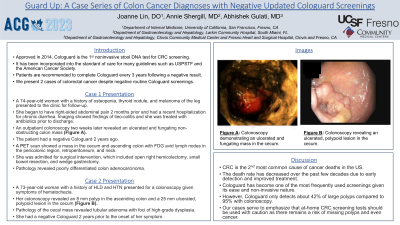Sunday Poster Session
Category: Colorectal Cancer Prevention
P0372 - Guard Up: A Case Series of Colon Cancer Diagnoses With Negative Updated Cologuard Screenings
Sunday, October 22, 2023
3:30 PM - 7:00 PM PT
Location: Exhibit Hall

Has Audio
- JL
Joanne Lin, DO
UCSF Fresno
Presenting Author(s)
Award: Presidential Poster Award
Joanne Lin, DO1, Annie Shergill, MD2, Abhishek Gulati, MD3
1UCSF Fresno, Fresno, CA; 2Larkin Community Hospital, Miami, FL; 3Clovis Community Medical Center, Clovis, CA
Introduction: Approved in 2014, Cologuard is the first noninvasive stool DNA test for colorectal cancer (CRC). It has been incorporated into the standard of care for CRC screening, including guidelines from US Preventative Services Task Force and the American Cancer Society. Patients are recommended to complete Cologuard every three years following a negative result. We present two cases of colorectal cancer despite negative routine Cologuard screenings.
Case Description/Methods: A 74-year-old woman with a history of osteopenia, thyroid nodule, and melanoma of the leg presented to the clinic for follow-up. She was in her usual state of health until two months ago when she began to have right-sided abdominal pain. She had a recent hospital admission for chronic diarrhea and imaging showed findings of ileocolitis. She was treated with antibiotics and discharged. A colonoscopy as an outpatient two weeks later revealed an ulcerated and fungating non-obstructing colon mass with a large colo-colonic fistula, diverticulosis, and hemorrhoids (Figure A). A positron emission tomography (PET) scan showed a mass in the cecum and ascending colon with FDG avid lymph nodes in the pericolonic region, retroperitoneum, and neck. She was admitted for surgical intervention, which included open right hemicolectomy, small bowel resection, and wedge gastrectomy. Pathology revealed poorly differentiated colon adenocarcinoma. The patient had routine CRC screenings with a negative Cologuard two years ago.
A 73-year-old woman with a history of hyperlipidemia and hypertension presented for an outpatient colonoscopy given she was having symptoms of hematochezia. Her colonoscopy revealed an 8 mm polyp in the ascending colon and a 25 mm ulcerated, polypoid lesion in the cecum (Figure B). Pathology for the cecal mass revealed a tubular adenoma with foci of high-grade dysplasia. She had a negative Cologuard two years prior to the onset of her symptom.
Discussion: Colorectal cancer is the second most common cause of cancer deaths in the United States. The death rate has decreased over the past few decades due to early detection and improved treatment. Cologuard has become one of the frequently used screenings given its ease and non-invasive nature. However, Cologuard only detects about 42% of large polyps compared to 95% with a colonoscopy. Our cases serve to emphasize that at-home colorectal cancer screening tests should be used with caution as there remains a risk of missing polyps and even cancer.

Disclosures:
Joanne Lin, DO1, Annie Shergill, MD2, Abhishek Gulati, MD3. P0372 - Guard Up: A Case Series of Colon Cancer Diagnoses With Negative Updated Cologuard Screenings, ACG 2023 Annual Scientific Meeting Abstracts. Vancouver, BC, Canada: American College of Gastroenterology.
Joanne Lin, DO1, Annie Shergill, MD2, Abhishek Gulati, MD3
1UCSF Fresno, Fresno, CA; 2Larkin Community Hospital, Miami, FL; 3Clovis Community Medical Center, Clovis, CA
Introduction: Approved in 2014, Cologuard is the first noninvasive stool DNA test for colorectal cancer (CRC). It has been incorporated into the standard of care for CRC screening, including guidelines from US Preventative Services Task Force and the American Cancer Society. Patients are recommended to complete Cologuard every three years following a negative result. We present two cases of colorectal cancer despite negative routine Cologuard screenings.
Case Description/Methods: A 74-year-old woman with a history of osteopenia, thyroid nodule, and melanoma of the leg presented to the clinic for follow-up. She was in her usual state of health until two months ago when she began to have right-sided abdominal pain. She had a recent hospital admission for chronic diarrhea and imaging showed findings of ileocolitis. She was treated with antibiotics and discharged. A colonoscopy as an outpatient two weeks later revealed an ulcerated and fungating non-obstructing colon mass with a large colo-colonic fistula, diverticulosis, and hemorrhoids (Figure A). A positron emission tomography (PET) scan showed a mass in the cecum and ascending colon with FDG avid lymph nodes in the pericolonic region, retroperitoneum, and neck. She was admitted for surgical intervention, which included open right hemicolectomy, small bowel resection, and wedge gastrectomy. Pathology revealed poorly differentiated colon adenocarcinoma. The patient had routine CRC screenings with a negative Cologuard two years ago.
A 73-year-old woman with a history of hyperlipidemia and hypertension presented for an outpatient colonoscopy given she was having symptoms of hematochezia. Her colonoscopy revealed an 8 mm polyp in the ascending colon and a 25 mm ulcerated, polypoid lesion in the cecum (Figure B). Pathology for the cecal mass revealed a tubular adenoma with foci of high-grade dysplasia. She had a negative Cologuard two years prior to the onset of her symptom.
Discussion: Colorectal cancer is the second most common cause of cancer deaths in the United States. The death rate has decreased over the past few decades due to early detection and improved treatment. Cologuard has become one of the frequently used screenings given its ease and non-invasive nature. However, Cologuard only detects about 42% of large polyps compared to 95% with a colonoscopy. Our cases serve to emphasize that at-home colorectal cancer screening tests should be used with caution as there remains a risk of missing polyps and even cancer.

Figure: Colonoscopies following negative updated Cologuard revealing colonic masses with subsequent pathology positive for colon cancer (Figure A, B).
Disclosures:
Joanne Lin indicated no relevant financial relationships.
Annie Shergill indicated no relevant financial relationships.
Abhishek Gulati indicated no relevant financial relationships.
Joanne Lin, DO1, Annie Shergill, MD2, Abhishek Gulati, MD3. P0372 - Guard Up: A Case Series of Colon Cancer Diagnoses With Negative Updated Cologuard Screenings, ACG 2023 Annual Scientific Meeting Abstracts. Vancouver, BC, Canada: American College of Gastroenterology.

